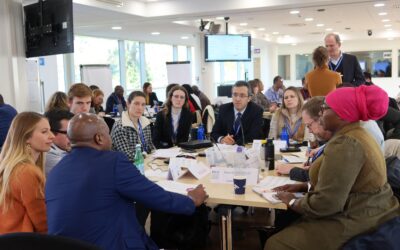To date, the cost of the global COVID-19 pandemic has most frequently been measured in lives lost and the cost to domestic economies, while triumphs have often been charted in terms of vaccine roll-outs and partial or full returns to the ‘freedoms’ outside lockdown.
However, the impacts of the pandemic are likely to extend over decades, with complex effects for politics, society, and the lives of the Covid generation. This long-term and intersectional impact formed the focus of our recent research inquiry, ‘Building resilience against exploitation in Senegal and Kenya in the context of Covid-19.’
Summary (English) | (Full Report (English) | Senegal Report (English, French) | Comparative Report (English, French)
Funded by the Modern Slavery Policy and Evidence Center, researchers from the University of Nottingham’s Rights Lab, working in partnership with Free the Slaves, examined the implications of the pandemic for resilience against exploitation in Dakar, Senegal, and Nairobi, Kenya. Free the Slaves in-country teams interviewed 47 key informants including government officials, civil society organisations, community groups and anti-trafficking organisations during January 2021, and organized stakeholder workshops to provide crucial feedback on the findings.
In addition to considering direct impacts on anti-trafficking work, the study took into account a wide range of factors that impact resilience against exploitation, including structural issues such as access to employment and education; regulatory matters, including the impact on access to justice; local institutional responses, and the effects on families and individuals.
Both countries had made a stringent government response to the pandemic, focusing initially on public health measures, including restrictions on travel, school closures and the use of ‘lockdown’ measures which limited or banned public gatherings. Following close on the heels of those packages, economic stimulus measures have been introduced to support the Senegalese and Kenyan economies.
Local government, community and civil society has also played a significant role as a catalyst for helping to reach vulnerable individuals, for instance participating in Senegal’s ‘zero-children on the streets’ initiative. However, in many cases, wider policy concerns such as anti-exploitation measures have been marginalized, as resources have been diverted to urgent pandemic responses.
We found that in both settings the pandemic heightened existing vulnerabilities and inequalities, leading to increased long-term risks of exploitation. Contributory factors included financial pressure on families leading to increased child labor, reductions in birth registration (which is the key to accessing rights attached to citizenship) and an extended gap in education for millions of school children, alongside widening gender inequalities and an increase in practices such as early marriage.
In addition, the pandemic had caused significant additional delays in legal systems, slowing access to justice for those who had experienced exploitation. Closed borders led to would-be migrants opting for more hazardous migration routes in Senegal, while Kenyan respondents reported challenges repatriating citizens who had experienced exploitation abroad. Trade union influence was also decreasing as job losses contributed to increased precarity for workers.
At a local level, we heard reports that stress and pressure in families breakdown was becoming more prevalent, with increased numbers of children turning to the streets. Local anti-trafficking organizations had also been affected by reduced access to policy-makers, decreased scope for offering services due to lockdowns, and higher pressure on emergency shelters.
In this challenging context, what strategy should the anti-trafficking movement adopt to build resilience against the increased risks for exploitation as the pandemic continues? Our study suggested that responding to COVID-19 brings an opportunity to re-think existing policies and interventions which are too often shaped by international funding priorities, with limited local resonance.
Firstly, our study provided evidence that the existing focus of anti-trafficking work in Senegal and Kenya was often too narrow (frequently focusing on children) and could be expanded to include more holistic programs addressed towards adults, families and communities.
Linked to this point, it is important for funders and policy-makers to adopt a whole-systems perspective in the context of the pandemic, that connects anti-exploitation measures with wider development programs tackling structural challenges such as educational disadvantage and gender inequalities. Attention to training, shelters and survivor-centered support remain essential, but international funders should also look to partner in ‘upstream’ initiatives that contribute to preventing exploitation.
Such initiatives would focus on the socioeconomic factors that create conditions of vulnerability and could, for example, target the educational disadvantages or gender inequalities that underpin exploitation in a given context.
Finally, it is important that future programs draw on local and grassroots expertise and enlist support from communities, in order to develop strategies that will be effective in delivering long-term social and economic change. One important step toward this is using local languages to discuss and debate law and policy relating to exploitation, and agreeing shared terminology for local priorities that does not have the colonial connotations of ‘slavery’ or ‘trafficking.’
By adopting this wider and more inclusive perspective it may be possible to enlist a wider range of organizations, communities and resources in creating a powerful and impactful response to locally-prevalent forms of exploitation. In turn, such a response would help in cutting the future costs of COVID-19.
Professor Alison Gardner is the Associate Director of the Rights Lab
Pauline Werner is Free the Slaves’ Program Coordinator



